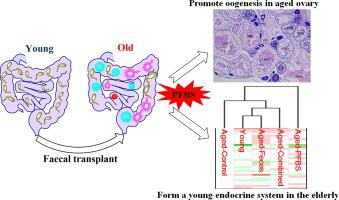Environment International ( IF 10.3 ) Pub Date : 2022-07-16 , DOI: 10.1016/j.envint.2022.107418 Chenyan Hu 1 , Mengyuan Liu 2 , Baili Sun 2 , Lizhu Tang 2 , Xiangzhen Zhou 2 , Lianguo Chen 3

|
The aging process leads to the gradual impairment of physiological functions in the elderly, making them more susceptible to the toxicity of environmental pollutants. In this study, aged zebrafish were first transplanted with the feces from young donors and subsequently exposed to perfluorobutanesulfonate (PFBS), an emerging persistent toxic pollutant. The interaction between young fecal transplant and PFBS inherent toxicity was investigated, focusing on reproductive performance and the underlying endocrine mechanism. The results showed that PFBS single exposure increased the percentage of primary oocytes in aged ovaries, implying a blockage of oogenesis. However, transplantation of young feces completely abolished the effects of PFBS and promoted oocyte growth, as inferred by the obviously lower percentage of primary oocytes, accompanied by a higher percentage of cortical-alveolar oocytes. Measurement of sex hormones found that PFBS significantly increased the blood concentration of estradiol and disrupted the balance of sex hormones in the elderly, which were, however, efficiently ameliorated by young fecal transplantation. Based on gene transcription along the hypothalamic-pituitary–gonadal axis, hierarchical clustering analysis showed similar profiles of the reproductive endocrine system between young zebrafish and their aged counterparts transplanted with young feces, implying that young fecal transplantation might refresh the endocrine system of aged recipients, regardless of PFBS exposure. The increased transcription levels of mRNAs encoding vitellogenin, activinBA, and membrane bound progestin receptors would cooperatively enhance the growth and maturation of oocytes in the ovaries of aged zebrafish receiving young fecal transplantation. Overall, the findings highlighted the potent efficacy of young fecal transplantation to improve the reproductive function of the elderly and to mitigate the endocrine disruption of an environmental pollutant. These findings are expected to broaden our understanding of the efficacy, mechanisms, and application of fecal transplantation.
中文翻译:

年轻的粪便移植可减轻全氟丁烷磺酸盐的毒性,并有效地刷新老年受者的生殖内分泌系统
衰老过程导致老年人生理功能逐渐受损,更容易受到环境污染物的毒性影响。在这项研究中,老年斑马鱼首先被移植到年轻捐赠者的粪便中,随后暴露于全氟丁烷磺酸盐 (PFBS),这是一种新兴的持久性有毒污染物。研究了年轻粪便移植与 PFBS 固有毒性之间的相互作用,重点关注生殖性能和潜在的内分泌机制。结果表明,PFBS 单次暴露增加了老年卵巢中初级卵母细胞的百分比,这意味着卵子发生受阻。然而,年轻粪便的移植完全消除了 PFBS 的作用并促进了卵母细胞的生长,正如原代卵母细胞的百分比明显降低所推断的那样,伴有较高百分比的皮质-肺泡卵母细胞。对性激素的测量发现,PFBS 显着增加了老年人血液中雌二醇的浓度并破坏了性激素的平衡,然而,这种情况通过年轻的粪便移植得到了有效的改善。基于沿下丘脑 - 垂体 - 性腺轴的基因转录,层次聚类分析显示年轻斑马鱼与移植年轻粪便的老年斑马鱼之间的生殖内分泌系统相似,这意味着年轻粪便移植可能会刷新老年受体的内分泌系统,无论 PFBS 暴露如何。编码卵黄蛋白、激活素BA、和膜结合的孕激素受体将协同促进接受年轻粪便移植的老年斑马鱼卵巢中卵母细胞的生长和成熟。总体而言,研究结果强调了年轻粪便移植在改善老年人生殖功能和减轻环境污染物内分泌干扰方面的强大功效。这些发现有望拓宽我们对粪便移植的功效、机制和应用的理解。











































 京公网安备 11010802027423号
京公网安备 11010802027423号